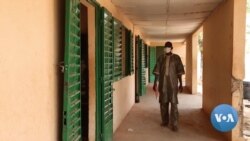Linguists and Braille experts in Mali have translated the country’s most widely spoken African language, Bambara, into Braille for the country's blind. Bambara is spoken and understood by about 15 million Malians, even more than the colonial French, making it an important step for blind people.
Moussa Keita has been at the Malian Union of the Blind (UMAV) since childhood — first, as a student, and now, as a teacher.
He is one of six instructors who will soon teach Braille in Bambara, the country's most widely spoken language. Before now, students learned Braille in Mali's colonial language, French.
In the shade of a tree by his classroom on the UMAV campus, Keita explains his pride in Bambara Braille.
"When I think of this project, that thought not just of the visually handicapped, but moreover, that thought of Africans, particularly of Malians, to write Braille in their own language … to try and adapt Braille to Bambara, which isn’t even the official language … really, it’s a feeling of pride and joy for us," he said.
Keita’s student, 15-year-old Abdoulaye Kané, explains the usefulness of Bambara Braille to him in the classroom.
"Now, if you don’t understand how to write something in French, you can write and read the word in Bambara. Then, you can understand how to write it in French," he says.
Abdoulaye Diallo is a blind physical therapist and a Braille specialist.
Diallo writes prescriptions and patient information on paper with a tool called a slate and stylus. The Braille is then translated into written French by clinic staff.
Taking a pause from treating patients, Diallo sits behind his clinic and talks about how teaching Braille in Bambara is a breakthrough for students and for blind adults who never had the chance to go to school.
"If I’m an adult, illiterate, and I’m going to learn Bambara, but I can see, I learn Bambara, and I can do whatever I want," he said. "If I’m an adult, but I’m blind, and I don’t know Bambara, I’m in the margins. So, it’s this Bambara [Braille], he says, which will save, which will give autonomy, to all these people who were in the margins.
Issiaka Ballo, a linguist expert at the University of Bamako, was contacted in 2019 by a nonprofit group called Sightsavers to spearhead the project to adapt Braille to Bambara.
Bambara has more letters than the French alphabet and more intonation, so new letters had to be created — but only within the six points available in the Braille cell.
Speaking from the Braille printing room at UMAV, Ballo says blind students in Mali will now have more access to education.
"If they can learn these subjects in their language, I think that will only strengthen the knowledge and mastery of science, the knowledge and mastery of literature, the knowledge about the world around us," he said.
In many schools, instruction is done in the local language rather than in French. Ballo says the next step is to translate Mali’s other national languages like Fulani and Songhay into Braille.





